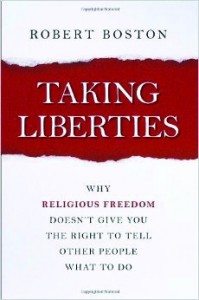Taking Liberties: Why Religious Freedom Doesn’t Give You the Right to Tell Other People What to Do

Humanism, in its quest for a secular society based on the principles of human kindness, reason, and democracy, has always staunchly advocated for religious freedom and separation of church and state. Most humanists realize that in order to foster an intellectually diverse and discrimination-free environment, all viewpoints must be represented and no religious ideology should be promoted or censored by the government. Why is it, then, that there are Bibles in schools, tax-exempt status for churches, limited marital rights for LGBTQ Americans, and limited access to birth control for women whose employers have a moral objection to it, all while Christians are declaring themselves persecuted? Such are the questions Robert Boston tackles in Taking Liberties: Why Religious Freedom Doesn’t Give You the Right to Tell Other People What to Do.
Boston begins with a short history of religious liberty in America, simultaneously refuting the religious right’s contention that the United States is a Christian nation, while also pointing towards some notable advocates of separation of church and state, from well-known figures like Thomas Jefferson and James Madison, to the lesser known but equally interesting Roger Williams and John Leland. This history is very cursory, and it doesn’t delve too far into the more abstruse and abstract legal and philosophical theories undergirding their positions, but it provides a good context for Boston’s critique of conservative abuses of “religious freedom.” Namely, that religious freedom somehow gives people the right to impose their religion on others (hence the subtitle of the book).
Each chapter tackles a different societal issue (for example, religion, sex, education, politics, culture, and persecution) and criticizes attempts by religious groups to expand their so-called religious freedom when what they want to do is impose their religion on others. The book is written for a very general audience, and Boston succeeds marvelously at making what might be a hefty topic for some extremely approachable and easy to understand. While it could have easily been a very dry read, Boston injects his writing with stinging bits of humor that make Taking Liberties a pleasure, as in the following passage on religious freedom and birth control:
During the recent debate over access to contraceptives, some owners of secular businesses have argued that even tolerating the presence of birth control in an employee healthcare plan is a gross violation of their religious liberty. Bear in mind that these employers are in no way required to pay directly for contraception. Birth control is simply folded into a much larger plan offering an array of healthcare options. Yet we are told that even this is too much, that the mere thought of Jane Employee possibly using birth control is more than Boss Smith’s tender sensibilities can bear and is an appalling violation of his religious freedom.
In the chapter on sex, Boston notes that whether or not same-sex couples can marry has no bearing on the religious freedom of their Christian neighbors. Religious freedom means the ability to practice your religion and congregate with others who share your beliefs. LGBTQ marriage rights have no bearing on this. In desperation, some churches say legalization of gay marriage will compel their churches to offer services to gay people. Boston points out what those churches already know: churches are not compelled to offer their services to anyone. As a private religious institution, a church can set its own requirements for who can join and is free to turn away anyone who violates these requirements. Ultimately, Boston argues, the religious right’s insistence that their religious freedom is being violated is merely a façade to hide their true agenda: imposing their ideology on others.

Robert Boston at the American Humanist Association’s 73rd Annual Conference.
This argument is repeated throughout the book. Perhaps because I already agree with the author’s points, and as a humanist I know the value of church-state separation, I didn’t experience any true shift in my thinking. However, as noted, the incendiary tone Boston strikes toward religious conservatives should prove enjoyable for liberal heathens like me. Conservatives who pick up this book might very well be turned off by some of the rhetoric.
Boston also addresses a mistake made by many nontheists, including me. Some of us think of separation of church and state as an explicitly secular issue; religious people want to govern others according to their theological views and we humanists are the only ones fighting back. As Taking Liberties points out, this simply isn’t true. Despite his blistering critique of the religious right, the author knows that there are “many deeply devout people who understand that church-state separation is a great boon to faith,” and that “most people of faith are happy to live and let live when it comes to matters of religion,” without “seek[ing] to impose their faith on others.” Nontheists, and the secular movement in general, would do well to remember that religious groups can be powerful allies. In fact, throughout the book Boston is careful to distinguish the religious right and the Catholic hierarchy from your average American theist. At the same time, he is always very careful to bring up nonbelievers in his discussion of church and state. Sometimes in discussions of religious freedom the freedom to not believe gets ignored, so I appreciated his commitment to inclusion.
Taking Liberties provides a solid case for a conception of religious freedom where everyone is free to practice their faith, or lack thereof, as they choose. For people with any background in First Amendment law or the history of religious freedom in America, this will be somewhat of a retread, but for the interested layperson the book serves as a nice introduction. With the recent Hobby Lobby decision striking a blow against religious freedom and the culture wars showing no sign of slowing down, religious freedom is as important an issue as ever. It is therefore vital for books like this to cut through the religious right’s bigotry and rhetoric to expose their notion of religious freedom for what it is: telling other people what to do.
